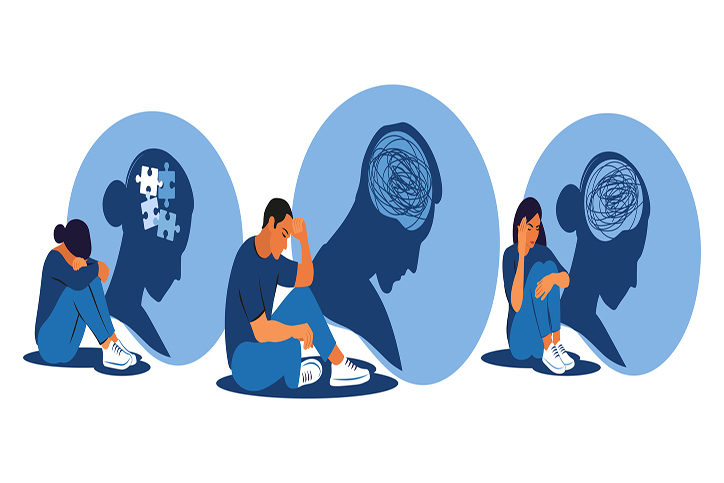Did you know that antidepressants are in the top five human exposure substance categories for Maryland’s older children (6-19 years), adults (20-59 years), and older adults (over 59 years)?
Antidepressants are medicines that are prescribed to treat symptoms of depression, anxiety, and other mental health conditions. Sometimes they are prescribed for other conditions such as chronic pain, sleeping disorders, and migraine.
In 2023, they were the second most common case in older children, third most common case in adults, and fourth most common case in older adults.
Let’s learn more about these medicines.
About Antidepressants
Antidepressants are prescribed by a health care provider and filled though a pharmacy. When starting these medicines, it may take 4-6 weeks for them to take full effect. It’s extremely important to work with your health care provider and support system (family, friends, etc.) when taking these medicines.
Antidepressants work in the brain by targeting neurotransmitters (chemical messengers) such as serotonin, norepinephrine, and dopamine. These neurotransmitters work to regulate mood, cognition (awareness and learning), behavior, sleep, and memory.
Not all antidepressants work the same way in the body when taken. Due to the side effects and body response to the different types of antidepressants, your health care provider may try a few different antidepressants to find one right for you.
Antidepressants can interact with other medicines (prescription, over-the-counter, vitamins, and supplements) so it’s important to share all of the different medicines you take with your health care provider before they prescribe you an antidepressant. It is also advised to avoid drinking alcohol and taking recreational drugs while taking antidepressants because they can make depressive symptoms worse. Talk to your health care provider about your alcohol and drug use before taking an antidepressant.
It is very important to take antidepressants as prescribed by your health care provider. Only take the amount that you are directed to take, as written on the label. Your health care provider may have you take it in the morning or the evening due to its side effects; be sure to follow their instructions. Do not share antidepressants with anyone. Do not stop taking an antidepressant suddenly without first speaking with your health care provider. Many of these medicines need to be stopped gradually.
Types of Antidepressants
Selective serotonin reuptake inhibitors (SSRIs) are the most commonly prescribed type of antidepressant. They increase serotonin in the brain, which helps regulate mood, appetite, sleep, and pain perception. Common SSRIs include fluoxetine, citalopram, sertraline, paroxetine, and escitalopram.
Serotonin and norepinephrine reuptake inhibitors (SNRIs) are similar to SSRIs in that they increase serotonin, but also increase norepinephrine. In addition to the serotonin effects mentioned above, the norepinephrine affects the body’s stress response, mood regulation, and alertness. Common SNRIs include venlafaxine, duloxetine, and desvenlafaxine.
Atypical antidepressants are a special type because they don’t fall into the main types of these medicines. Bupropion has no effect on serotonin but increases dopamine and norepinephrine to help with increasing energy, motivation, and attention. Bupropion is often prescribed to help treat symptoms from smoking cessation and seasonal affective disorder. Mirtazapine increases serotonin and norepinephrine and helps with sleeping and appetite. Trazodone increases serotonin and helps with sleeping, nightmares from PTSD, and anxiety.
Other antidepressants that are less commonly prescribed include tricyclic, tetracyclic, monoamine oxidase inhibitors (MAOI), and augmentation (combination of multiple medicines).
Side Effects
Antidepressants can cause side effects for some people, but not all! Some side effects will only be present in the beginning as people’s bodies adjust to taking the medicine, while others can last throughout taking the medicine.
Common side effects for most antidepressants include:
- Upset stomach
- Vomiting
- Weight gain
- Diarrhea
- Sleepiness
- Dry mouth
There are certain antidepressants that have different side effects than these common ones. If you are interested in learning what side effects to expect with an antidepressant, read the information sheet that you receive with the medicine from the pharmacy. You can also ask your health care provider what side effects to expect.
There are some cases where children, teenagers, and young adults may experience an increase in suicidal thoughts or behavior when beginning taking antidepressants or when the dose is changed.
If you are experiencing side effects while taking an antidepressant, share and be honest about it with your health care provider. Sometimes adjusting the dose will help. And, as mentioned above, the side effects may go away after the first few weeks of taking the medicine as your body adjusts. You can work with your health care provider to find the antidepressant that works best for you.
Safe Storage
It is important to store antidepressants safely. Because of the side effects, only people prescribed antidepressants under the care of a health care provider should take these medicines.
We covered a lot of important information here today. Remember it is important to talk openly and honestly with your health care provider about side effects from these medicines. The Maryland Poison Center is here to help if your health care provider is unavailable and you need help identifying if the way you’re feeling is a possible side effect, or if you need help learning if there are drug interactions with a medicine you want to start taking. We are also here if you or someone you know took the wrong dose of antidepressant or the wrong person takes an antidepressant that wasn’t prescribed for them. We are open 24/7 and calling is free and confidential at 1-800-222-1222.





Leave a Reply